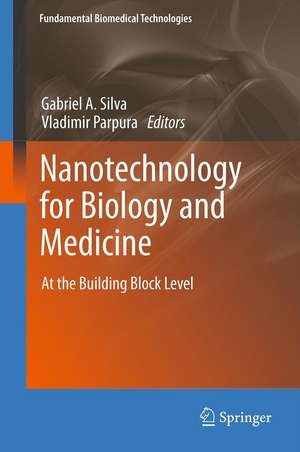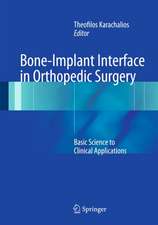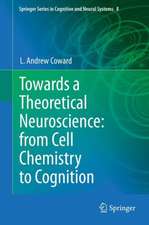Nanotechnology for Biology and Medicine: At the Building Block Level: Fundamental Biomedical Technologies
Editat de Gabriel A. Silva, Vladimir Parpuraen Limba Engleză Paperback – 29 noi 2013
| Toate formatele și edițiile | Preț | Express |
|---|---|---|
| Paperback (1) | 1091.85 lei 43-57 zile | |
| Springer – 29 noi 2013 | 1091.85 lei 43-57 zile | |
| Hardback (1) | 1095.73 lei 43-57 zile | |
| Springer – 21 oct 2011 | 1095.73 lei 43-57 zile |
Preț: 1091.85 lei
Preț vechi: 1149.32 lei
-5% Nou
Puncte Express: 1638
Preț estimativ în valută:
208.95€ • 217.34$ • 172.50£
208.95€ • 217.34$ • 172.50£
Carte tipărită la comandă
Livrare economică 14-28 aprilie
Preluare comenzi: 021 569.72.76
Specificații
ISBN-13: 9781461430230
ISBN-10: 1461430232
Pagini: 252
Ilustrații: XVI, 236 p.
Dimensiuni: 155 x 235 x 13 mm
Greutate: 0.36 kg
Ediția:2012
Editura: Springer
Colecția Springer
Seria Fundamental Biomedical Technologies
Locul publicării:New York, NY, United States
ISBN-10: 1461430232
Pagini: 252
Ilustrații: XVI, 236 p.
Dimensiuni: 155 x 235 x 13 mm
Greutate: 0.36 kg
Ediția:2012
Editura: Springer
Colecția Springer
Seria Fundamental Biomedical Technologies
Locul publicării:New York, NY, United States
Public țintă
Professional/practitionerCuprins
1. Structure and biology of the cellular environment: The extracellular matrix.- 2. Synthesis and patterning methods for nanostructures useful for biological applications.- 3. Characterization of nanoscale biological systems: Multimodal Atomic Force microscopy for Nanoimaging, nanomechanics and biomolecular interactions .- 4. Molecular motors and machines.- 5. Micro and Nano Engineered Extracellular Matrices.- 6. Designer self-assembling peptide nanofiber scaffold.- 7. Quantum Dot Imaging of Neural Cells and Tissue.- 8. Quantum Dot Nanotechnologies for Neuroimaging .- 9. Carbon nanotubes as electrical interfaces to neurons.- 10. Carbon nanotubes as modulators of neuronal growth.
Textul de pe ultima copertă
Nanotechnology for Biology and Medicine: At the Building Block Level introduces the reader to current cutting-edge approaches being pursued for the design and development of nanotechnology applications to different areas of biology and medicine. It discusses the key biological challenges at the molecular and cellular levels being faced by this new field, and some of the strategies being developed to address them. The specific topics covered include the extracellular environment and design of engineered matrices, synthetic patterning methods for biological applications, molecular motors and machines, atomic force microscopy methods for measuring nanoscale features, and the use of quantum dot and carbon nanotube nanotechnologies for imaging and interfacing with neural cells. It is intended to serve as an introduction to the field, while providing in-depth coverage for the more advanced reader.
Gabriel A. Silva, MSc, PhD is the Jacobs Faculty Fellows Professor of Bioengineering and an Associate Professor in the Departments of Bioengineering and Ophthalmology at the University of California, San Diego. He also is co-director of the Retina Engineering Center in the Institute of Engineering in Medicine. He is an affiliated faculty member in the Department of NanoEngineering, and a member of the Neurosciences Graduate Program, Computational Neurobiology Program, and Institute for Neural Computation. He received his Hon.B.Sc. and M.Sc. from the University of Toronto in 1996 and 1997, and a Ph.D. from the University of Illinois at Chicago in 2001. Dr. Silva completed a postdoc at Northwestern University in Chicago from 2001 to 2003, and joined the faculty at the University of California, San Diego in 2004.
Vladimir Parpura, MD, PhD holds both a medical degree, awarded from the University of Zagreb in Croatia in 1989, and a doctorate, received in Neuroscience and Zoology from Iowa State Universityin 1993. He has held faculty appointments at the Department of Zoology and Genetics, Iowa State University and the Department of Cell Biology and Neuroscience, University of California Riverside. He is presently an Associate Professor in the Department of Neurobiology, University of Alabama Birmingham.
Gabriel A. Silva, MSc, PhD is the Jacobs Faculty Fellows Professor of Bioengineering and an Associate Professor in the Departments of Bioengineering and Ophthalmology at the University of California, San Diego. He also is co-director of the Retina Engineering Center in the Institute of Engineering in Medicine. He is an affiliated faculty member in the Department of NanoEngineering, and a member of the Neurosciences Graduate Program, Computational Neurobiology Program, and Institute for Neural Computation. He received his Hon.B.Sc. and M.Sc. from the University of Toronto in 1996 and 1997, and a Ph.D. from the University of Illinois at Chicago in 2001. Dr. Silva completed a postdoc at Northwestern University in Chicago from 2001 to 2003, and joined the faculty at the University of California, San Diego in 2004.
Vladimir Parpura, MD, PhD holds both a medical degree, awarded from the University of Zagreb in Croatia in 1989, and a doctorate, received in Neuroscience and Zoology from Iowa State Universityin 1993. He has held faculty appointments at the Department of Zoology and Genetics, Iowa State University and the Department of Cell Biology and Neuroscience, University of California Riverside. He is presently an Associate Professor in the Department of Neurobiology, University of Alabama Birmingham.
Caracteristici
The contributions in this book have been written by some of the pioneers in the development and application of nanotechnology to biology and medicine It is a reflection and testament to the amount of progress that has occurred in an incredibly short period of time comparative to the long history of science Meant to give a realistic picture of open problems and challenges that need to be resolved Includes supplementary material: sn.pub/extras

























